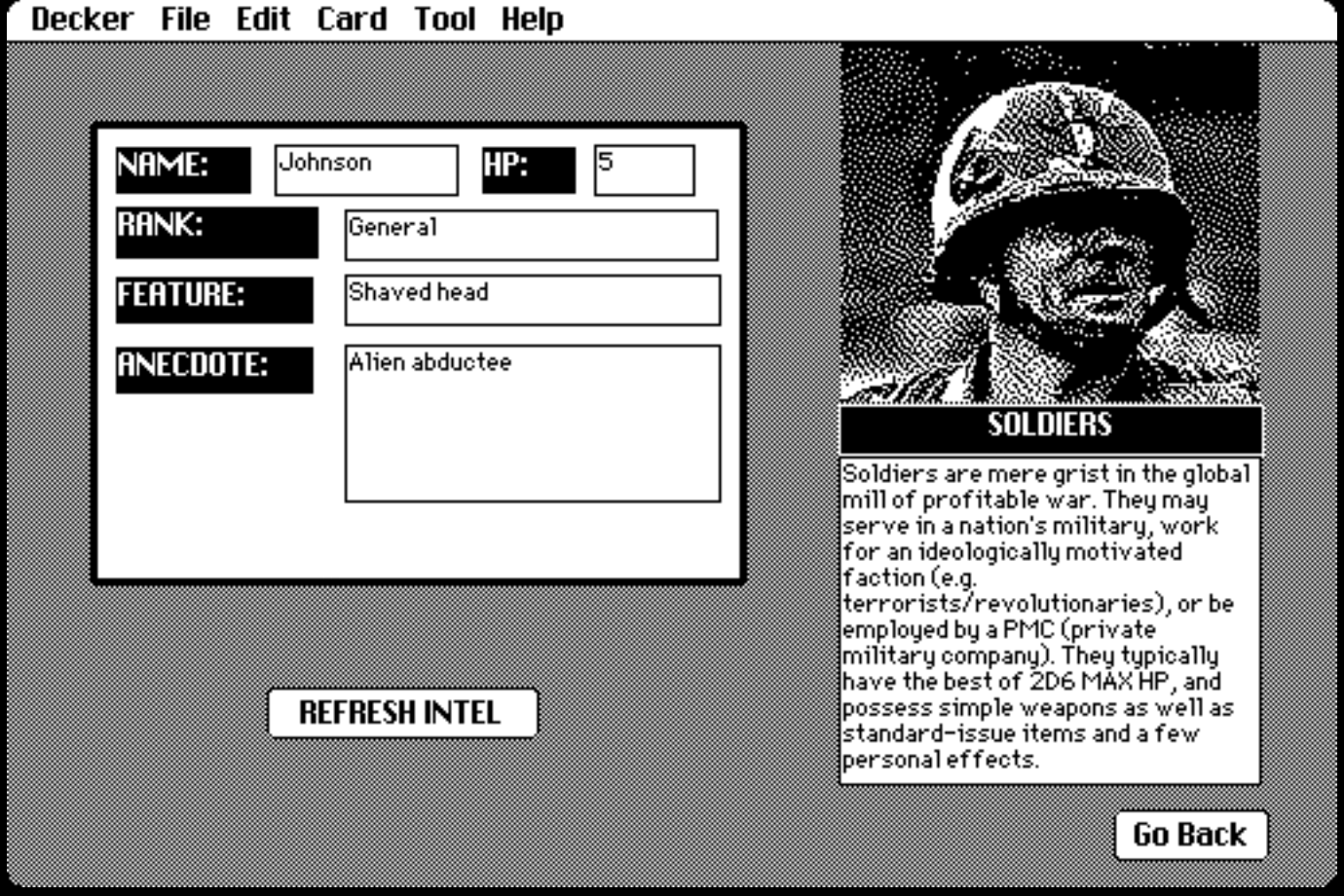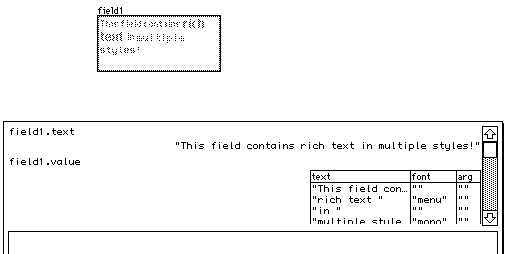Having a blast working within Decker, but coming up short in trying to figure out how to turn a substring within a rich text field into a hyperlink from an onclick event. I know how to make text a hyperlink from the Text menu option, but I want to call a function that will sometimes change the text property of a field to a string containing a hyperlink. Hopefully that makes sense!
I think I follow you.
Copying rich text from one field to another requires accessing their "value" property. Let's say we have rich text fields name "target", "a", and "b". The "a" field contains a link, and the "b" field does not:

In the button above I have a script like this which randomly picks between the value of "a" and "b":
on click do target.value:random[(list a.value),(list b.value)] end
In this example, the values each need to be wrapped in a sublist with the "list" operator before joining them together with "," to prevent the rich text tables from being fused together into a single table.
The "a" and "b" fields could be hidden from view (Widgets -> Show None), and this approach generalizes to any number of alternative texts.
If you want to programmatically modify existing rich text to insert links it's a bit more complicated. Rich text is represented in Decker as a table, and the rtext interface contains some functions that can make it easier to manipulate such a table. If you wanted to change the styling of a specific range of characters within a field, you could use rtext.span[] to grab the text before and after your region of interest, retaining their existing styling, rtext.string[] to extract a region of interest without its styling, rtext.make[] to create a new styled chunk (including a hyperlink or inline image), and rtext.cat[] to glue all the pieces back together. If this is a road you need to go down I can try to furnish a more detailed example if you clarify your requirements. The dialogizer demo deck uses rtext functions to build its index on the fly.
Does that help at all?
That absolutely does, thank you! I realize though that I could have done a better job providing context. I'm migrating a project that generates content for a tabletop RPG from something I built in Twine to Decker. A lot of random[] functions.
For a lot of the cards I'm working on, there's a contextual link between them that's based around a single word. In the below case, the word "Alien" in the Anecdote field would ideally be hyperlinked to a card titled Aliens, which would have a similar list of fields with randomly selected values in fields. I initially tried including link[aliens] in the array, but that just caused the aliens card to load upon clicking the button that contained the array.

These results are never a composite of multiple results, but just a fixed list of potential results, just in some cases there's a "contextual link" to another card. So as far as the solutions you provided, I could have "link fields" that contain the few instances of when a link makes sense within the card and just use *.text as the array value in those cases, right? I'm willing to do this programmatically if it'll be a cleaner solution, though. Thank you again!
Just to make sure you're clear on the distinction, a field's .value attribute is a table, and a field's .text attribute is a string:

An rtext table can contain hyperlinks, inline images, and multiple fonts, but a plain string cannot. In many situations that ask for an rtext table you can supply a string and it will be "widened" into rtext, but it will all be in the default font. If you copy the .value of one rich text field to another it will preserve its formatting, but if you copy the .text you will flatten it out into a plain text representation.
(For anyone with web development experience, field.value versus field.text is loosely similar to element.innerHTML versus element.innerText.)
Decker 1.34 introduced a new "rtext.replace[]" utility function that might be handy. If you're working with a lot of text, links, and cards, it might be useful to write a deck-level utility function that finds certain keywords in a string or rtext table and replaces them with appropriate links, which you could then call whenever you populate a field. For example, perhaps something like this:
on contextualize text do db:insert keyword replacement with "Alien" rtext.make["Alien" "" "About Aliens" ] "Weapon" rtext.make["Weapon" "" "Weaponry" ] "Snacks" rtext.make["Snacks" "" "Delicious Treats" ] "Zombo" rtext.make["Zombo" "" "https://zombo.com"] end rtext.replace[text db.keyword db.replacement] end
There's basically no limit to the possible complexity here (for example, you could automatically populate the keyword list by inspecting the titles of cards in the current deck), so it's up to you to choose what makes sense to you and is reasonably convenient for your purposes.
First off I really appreciate your time in providing practical solutions. I gave this my best shot before returning here but every attempt I made at implementing the utility function you provided, at either the deck level down to the control itself, did not seem to work. I could get it to work within the Listener, but any table expressions seemed to do nothing outside of Listener. I'm sure I'm missing something, but I couldn't find a solution or workaround.
Are you writing the result into a widget?
If you had a rich text field named "foo" which contained some of the words defined in the table for contextualize[], you'd apply it to the field something like this:
foo.value:contextualize[foo.value]
- reading "foo.value" produces a rich text table.
- "contextualize[foo.value] " calls the contextualize function with that rich text table and returns a modified rich text table.
- the colon (:) is the assignment operator in Lil.

